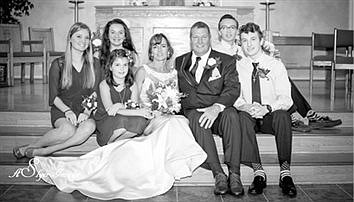July 10, 2018 at 6:48 p.m.
BLESSED BY CHURCH
Priest sees more couples convalidating marriages
Ginger and Jim McDade of St. Jude the Apostle parish in Wynantskill always wanted to have their marriage convalidated.
“I think it adds a positive weight on marriage and your respect to each other,” Mrs. McDade said.
Convalidation is the process of having one’s marriage blessed and formally recognized by the Catholic Church. According to canon (Church) law, approved Catholic wedding ceremonies must take place in a church or shrine with a Catholic deacon or priest officiating, unless the couple got an exception to this rule from their diocese prior to the ceremony.
Without such an exception, the marriage is not recognized as a valid sacramental union in the eyes of the Church. That means couples who marry at City Hall or on the beach don’t usually have a marriage that’s considered valid by the Church.
Additionally, if one partner was previously married but never received an annulment of his or her first marriage, the second marriage is not recognized by the Church until an annulment is received.
Couple’s experience
The McDades had both been previously married and divorced, so they needed to go through the annulment process. The couple had a civil ceremony a decade ago — but, last November, they celebrated their 10-year anniversary by having their marriage convalidated at St. Jude parish.
“I was just as nervous as the first day I was marrying him, and I had been married to him for 10 years,” Mrs. McDade recalled.
While the annulment process took about a year to complete — the average length of time it takes in the Albany Diocese — Mrs. McDade said she knew the importance of having their marriage recognized in the Church. She said it “definitely deepened” her faith.
Trending
In the past few years, said Rev. Anthony Ligato, more and more couples like the McDades have reached out about having their marriage convalidated.
Father Ligato is pastor of St. Jude and of St. Michael the Archangel parish in Troy, and vicar for vocations for the Albany Diocese.
Around 2008 and during the time of the country’s “great recession,” Father Ligato said that approximately a third of the marriages he oversaw were convalidations. Last year, that number jumped from a third to half.
“People come to me and say, ‘Father, we’ve been wanting to do this for so long,’” said the pastor.
“It’s never easy for a couple to approach a priest [about convalidation], especially when they’ve been married for a number of years,” he added.
Father Ligato said most of the convalidations he celebrates are for older couples who have realized the importance of their faith later in life and want their marriage recognized by the Church. Other couples who were previously married have expressed an interest in convalidation, as well, and have told him they never pursued it because of the need to get an annulment first.
Mrs. McDade agrees that more couples are realizing, with age, the importance of convalidation: “It seems like more couples are saying, ‘We had always wanted to be married in the Church; we just had to go through the process.’”
Pope’s perspective
Father Ligato believes the increase in convalidations was helped by Pope Francis’ call to simplify the annulment process and better welcome couples into the sanctity of marriage.
In 2016, the Albany Diocese waived its annulment processing fees in response to the Holy Father’s words. While the Diocese never denied applicants who were unable to pay the fee — which was only $100 for filing and $250 upon completion of the case — diocesan officials said the removal made the annulment process feel more approachable for couples.
Father Ligato said that eliminating the fee entirely “sent a positive message” that the Church was there to assist couples trying to reignite their faith.
Mrs. McDade completed her annulment process in 2016. She said the small fee had never stopped her or her husband from pursuing convalidation, but she is “happy to hear” that the fee was removed.
If an annulment is obtained, the parish checks the couple’s marriage license, baptismal certificates and annulment papers. Parishes also have couples attend a pre-Cana program, just as couples do who are marrying for the first time. Then the couple meets with their priest to plan the liturgy and convalidation ceremony.
Mrs. McDade said she wanted her convalidation to be like her wedding day, with close family, friends and their children present to witness the ceremony of unity.
“We had flowers [and] got to celebrate with all our children, my mom, his mom, close family, relatives,” she said. “It was perfect.”
(The diocesan Tribunal is the office that handles marriage annulments. Contact the Tribunal at 518-453-6620.)
- Rhode Island Catholic bishop offers prayers in wake of shooting at Brown University
- 12 dead, including gunman, in anti-Jewish terror attack at Bondi Beach in Australia
- Hollywood actor and Broadway star talk faith ahead of special Christmas performance
- Minnesota bishop leads prayer service after ICE detention of parent of Catholic school student
- Our Lady of Guadalupe procession, Mass draw thousands to St. Patrick’s Cathedral
- Albany’s new bishop tells faithful to ‘have the courage to proclaim your Messiah to all’
- Washington Roundup: Supreme Court hears case on independent agencies; CDC abortion report delayed
- Emergency foodstuffs from Florida Catholics delivered to people in eastern Cuba
- Our Lady of Guadalupe transcends borders, brings us together, says Texas archbishop
- Illinois legalizes assisted suicide, despite outcry from bishops, pro-life advocates








Comments:
You must login to comment.